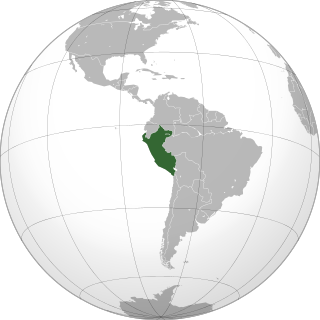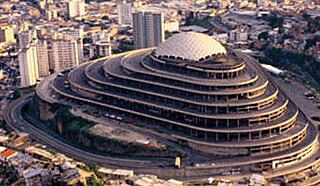
The Shining Path, self-named the Communist Party of Peru, is a far-left political party and guerrilla group in Peru, following Marxism–Leninism–Maoism and Gonzalo Thought. Academics often refer to the group as the Communist Party of Peru – Shining Path to distinguish it from other communist parties in Peru.

Lesbian, gay, bisexual, and transgender (LGBT) people in Peru face some legal challenges not experienced by other residents. Same-sex sexual activity among consenting adults is legal. However, households headed by same-sex couples are not eligible for the same legal protections available to opposite-sex couples.

As established in the Colombian Constitution of 1991, women in Colombia have the right to bodily integrity and autonomy; to vote ; to hold public office; to work; to fair wages or equal pay; to own property; to receive an education; to serve in the military in certain duties, but are excluded from combat arms units; to enter into legal contracts; and to have marital, parental and religious rights. Women's rights in Colombia have been gradually developing since the early 20th Century.

Equanimal was a Spanish non-profit animal rights organization, formed as a merger, in 2006, of the organisations Alternativa para la Liberación Animal and Derechos para los Animales. In 2012, it merged with the International animal rights organization Animal Equality.

The 2017 Venezuelan protests were a series of protests occurring throughout Venezuela. Protests began in January 2017 after the arrest of multiple opposition leaders and the cancellation of dialogue between the opposition and Nicolás Maduro's government.

Foro Penal is a Venezuelan human rights organization that provides legal assistance pro bono to people subject of arbitrary detentions and their relatives. The organization is composed of regional coordinators for each state in Venezuela, pro bono lawyers on a national level and a network of over five thousand volunteers, non-lawyer activists, known as "active defensors".

On 24 December 2017, the President of Peru, Pedro Pablo Kuczynski, pardoned jailed ex-president Alberto Fujimori. Because the pardon was granted on Christmas Eve, it became known as the "indulto de Navidad".

Torture in Venezuela has been a consistent phenomenon throughout its history. Various dictatorships from the Spanish colonial era into the twentieth century utilized torture against common criminals and political opponents. In the twentieth century, torture was common during the dictatorships of Juan Vicente Gómez and Marcos Pérez Jiménez. Torture also took place occasionally during Venezuela's democratic period, particularly during social outbursts, such as during the Caracazo and the 1992 coup attempts.

The 2018 Nicaraguan protests began on 18 April 2018 when demonstrators in several cities of Nicaragua began protests against the social security reforms decreed by President Daniel Ortega that increased taxes and decreased benefits. After five days of unrest in which nearly thirty people were killed, Ortega announced the cancellation of the reforms; however, the opposition has grown through the 2014–2018 Nicaraguan protests to denounce Ortega and demand his resignation, becoming one of the largest protests in his government's history and the deadliest civil conflict since the end of the Nicaraguan Revolution. On 29 September 2018, political demonstrations were declared illegal by President Ortega.

A series of massive demonstrations and severe riots, known in Chile as the Estallido Social, originated in Santiago and took place in all regions of Chile, with a greater impact in the regional capitals. The protests mainly occurred between October 2019 and March 2020, in response to a raise in the Santiago Metro's subway fare, a probity crisis, cost of living, university graduate unemployment, privatisation, and inequality prevalent in the country.

The 2020 Peruvian protests were a series of demonstrations sparked after the removal of President Martín Vizcarra that took place from 9 November to 17 November 2020.

Luis Alberto Otárola Peñaranda is a Peruvian attorney and politician who was the Prime Minister of Peru from 2022 until his resignation in 2024. He previously served as Minister of Defense twice, under Ollanta Humala and Dina Boluarte.

Dina Ercilia Boluarte Zegarra is a Peruvian politician, civil servant, and lawyer since 2022 serving as the 64th president of Peru. She had served as the first vice president and minister at the Ministry of Development and Social Inclusion under President Pedro Castillo. She served as an officer at the National Registry of Identification and Civil Status (RENIEC) from 2007 until 2022.

Michael Espinoza Coila is a peruvian lawyer, university professor, human rights activist and catechist, dedicating himself to Criminology and information technology (ICT). He is known for developing the principle-law-procedure of the best interests of the student and the criminological theory of piety, is also a law activist for university student.

Mass protests in Peru against inflation and President Pedro Castillo's government began in March 2022. The protests occurred amid rising fertilizer and fuel prices caused by Russia's invasion of Ukraine and international sanctions imposed on Russia. Some of the larger protests were organized by Geovani Rafael Diez Villegas, the leader of the Union of Multimodal Transport Guilds of Peru (UGTRANM) who had previously collaborated in late 2021 with business executives and right-wing politicians, opposing the Castillo government and whose power is recognized as rivaling the government's own Ministry of Transport and Communications. Diez Villegas demanded the removal of passenger restrictions on buses, pardons for transportation workers who were charged with crimes, and negotiations for forgiving debt owed by transportation businessmen to the government. He later organized a general strike aimed at paralysing transportation in Peru beginning on 4 April 2022 that resulted in protests, product shortages, transportation stoppages and rioting.

The presidency of Dina Boluarte began with her inauguration as the president of Peru on 7 December 2022, immediately following the removal of Pedro Castillo from office in the aftermath of his attempted self-coup.

Following the ousting of president of Peru, Pedro Castillo on 7 December 2022, a series of political protests against the government of president Dina Boluarte and the Congress of Peru occurred. The demonstrations lack centralized leadership and originated primarily among grassroots movements and social organizations on the left to far-left, as well as indigenous communities, who feel politically disenfranchised. Castillo was removed from office and arrested after announcing the illegal dissolution of Congress, the intervention of the state apparatus, and the forced establishment of an "emergency government", which was characterized as a self-coup attempt by all government institutions, all professional institutions, and mainstream media in Peru while Castillo's supporters said that Congress attempted to overthrow Castillo. Castillo's successor Dina Boluarte, along with Congress, were widely disapproved, with the two receiving the lowest approval ratings among public offices in the Americas. Among the main demands of the demonstrators are the dissolution of Congress, the resignation of Boluarte, new general elections, the release of Castillo, and the formation of a constituent assembly to draft a new constitution. It has also been reported that some of the protesters have declared an insurgency in Punos's region. Analysts, businesses, and voters said that immediate elections are necessary to prevent future unrest, although many establishment political parties have little public support.

The Ayacucho massacre was a massacre perpetrated by the Peruvian Army on 15 December 2022 in Ayacucho, Peru during the 2022–2023 Peruvian protests, occurring one day after President Dina Boluarte, with the support of right-wing parties in Congress, granted the Peruvian Armed Forces expanded powers and the ability to respond to demonstrations. The clash occurred due to the protesters' attempt to storm the local airport. On that day, demonstrations took place in Ayacucho and the situation intensified when the military deployed helicopters to fire at protesters, who later tried to take over the city's airport, which was defended by the Peruvian Army and the National Police of Peru. Troops responded by firing live ammunition at protesters, resulting in ten dead and 61 injured. Among the injured, 90% had gunshot wounds, while those killed were shot in the head or torso. Nine of the ten killed had wounds consistent with the ammunition used in the IMI Galil service rifle used by the army.

The Juliaca massacre occurred on January 9, 2023, in the city of Juliaca, located in Peru’s Puno Department, amid widespread protests against President Dina Boluarte's government. The event marked one of the deadliest confrontations during the 2022–2023 Peruvian political protests, which erupted following the ousting and imprisonment of former president Pedro Castillo. Peruvian National Police opened fire on demonstrators, who were primarily from the Aymara and Quechua Indigenous communities, resulting in the deaths of at least 18 civilians, including a medical worker, and injuries to over 100 individuals. Most fatalities were caused by gunshot wounds, with reports indicating the use of military-grade weapons by police, sparking widespread condemnation.
This is a broad timeline of the 2022–2023 Peruvian protests against the government of Dina Boluarte and the Congress of Peru, sparked by the self-coup attempt of President Pedro Castillo, who was later arrested for his actions. The protests were organized by social organizations and indigenous peoples who felt they experienced political disenfranchisement, specifically on the politically left-wing to far left, with the groups demanding immediate general elections and a constituent assembly to draft a new Constitution of Peru.


















